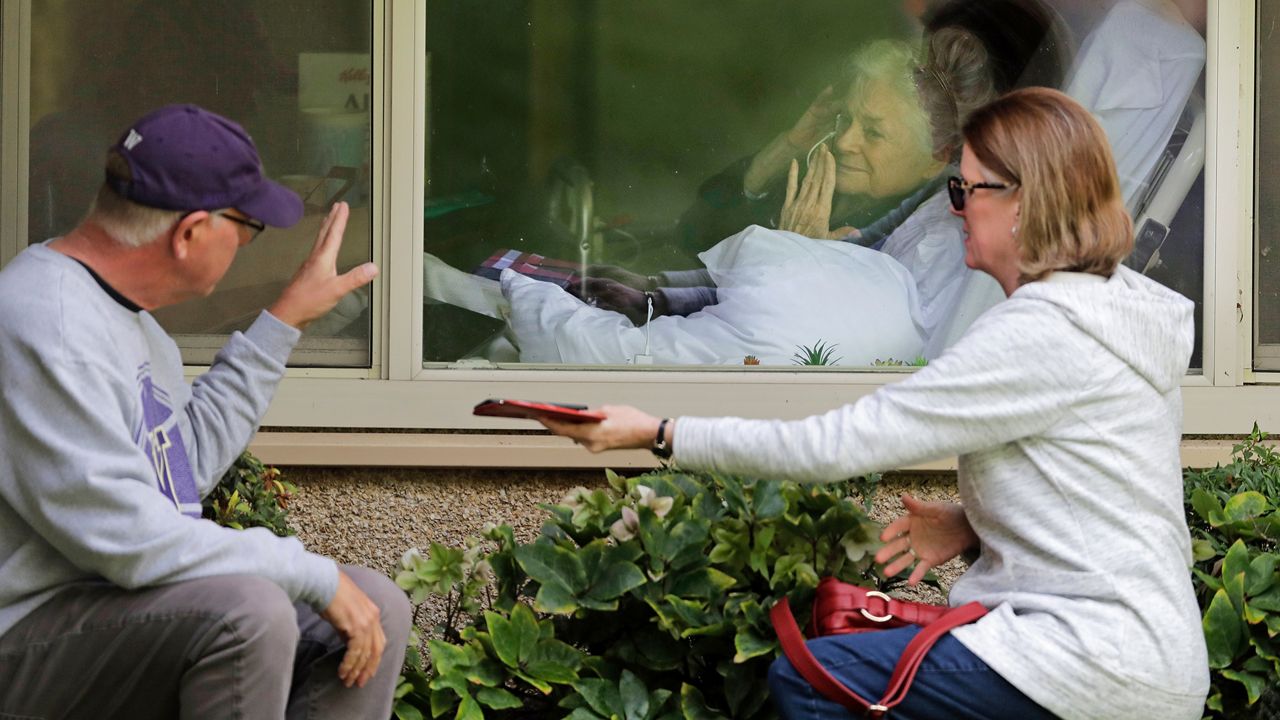COLUMBUS, Ohio — Ohio cannot relax nursing home visitation restrictions due to federal rules, but Gov. Mike DeWine said Monday he sent a letter to facilities instructing them to allow exceptions to visitation restrictions in a wide range of circumstances.
With vaccinations the number of COVID-19 cases in nursing homes continues to plummet. The governor said it’s time for more facilities to resume visits. Last week, long-term care facilities reported 343 new cases, down from the high in December of 2,832 new cases, he said during a news conference Monday.
In September, the Centers for Medicare & Medicaid Services (CMS) issued three requirements for visitation: The facility must have no new COVID-19 cases in the last 14 days, it must not currently be conducting “outbreak testing,” and the county’s positivity rate must be less than 10%, DeWine explained.
“They override really anything that the state does. Nursing homes have to comply with these federal regulations, but I do want to talk about some exceptions under the federal law,” he said.
Even if those criteria are not met, “compassionate care visits” are allowed, he said. These supplement end-of-life exceptions and apply to far more situations.

“Compassionate care visitations are special visits in which the family member or other visitor provides comfort, support, and assistance to a resident whose well-being is suffering, or at risk. These visits should be utilized in many circumstances to get that loved one well again or to halt a decline in that loved one,” DeWine said. “Under the federal CMS rules, compassionate care visits are always allowed.”
He provided a long and “not exhaustive” list of exceptions that Ohioans can use to see their loved ones in nursing homes and assisted living facilities:
- A recently admitted resident is struggling with a change in environment and the lack of physical family support
- A resident is grieving after a friend or family member recently died
- A resident is experiencing weight loss or dehydration because they are no longer getting contact with a family member or caregiver who previously provided encouragement
- A resident who used to talk and interact with others is experiencing emotional distress. For example, they are seldom speaking, or they are crying more frequently
- A resident is readmitted to a long-term care facility after a hospitalization
- A resident has a new order for an anti-psychotic drug, an antidepressant, or an appetite stimulant
- A resident's dementia has dramatically progressed
- During window visits, loved ones have noticed a change in the resident's appearance, grooming, or their cognitive ability
- A resident is no longer responding to loved ones during virtual visits
In June, Ohio resumed outdoor visitation for assisted-living facilities, and in July expanded outdoor visits to nursing homes.
The governor said families can use these exceptions to see their loved ones, and he was joined by Director of the Department of Aging Ursel McElroy who said residents getting push back from a facility can call 1-800-282-1206 and speak with a long-term care ombudsman who’ll represent them to arrange a visit.
The governor’s letter reminded nursing homes in areas that are still above 10% positivity to frequently check county rates and to allow visitation when it drops below the threshold. The state’s positivity rate was 5% as of Feb. 20.
The letter also stressed that nursing homes are to allow for compassionate care visits.
“To make sure that there is a full understanding of this, I am sending a letter today. This is a letter that I'm sending to all nursing homes in the state of Ohio,” he said. “If you have a loved one in need of a compassionate care visit and that loved one is not getting that visit, and you're being stopped from visiting, you have rights. You're empowered to get that visit scheduled.”



